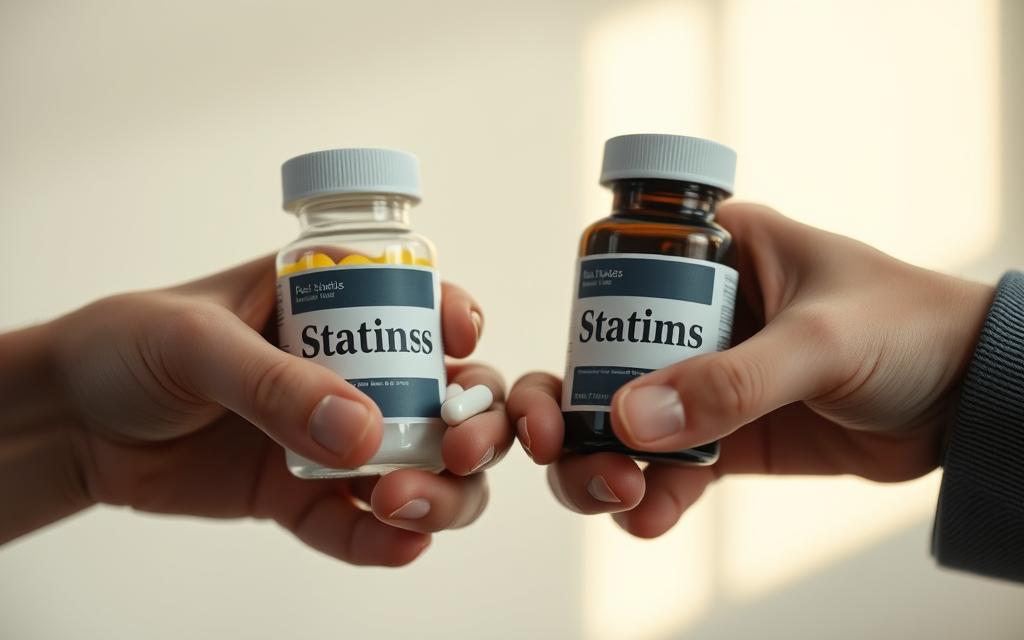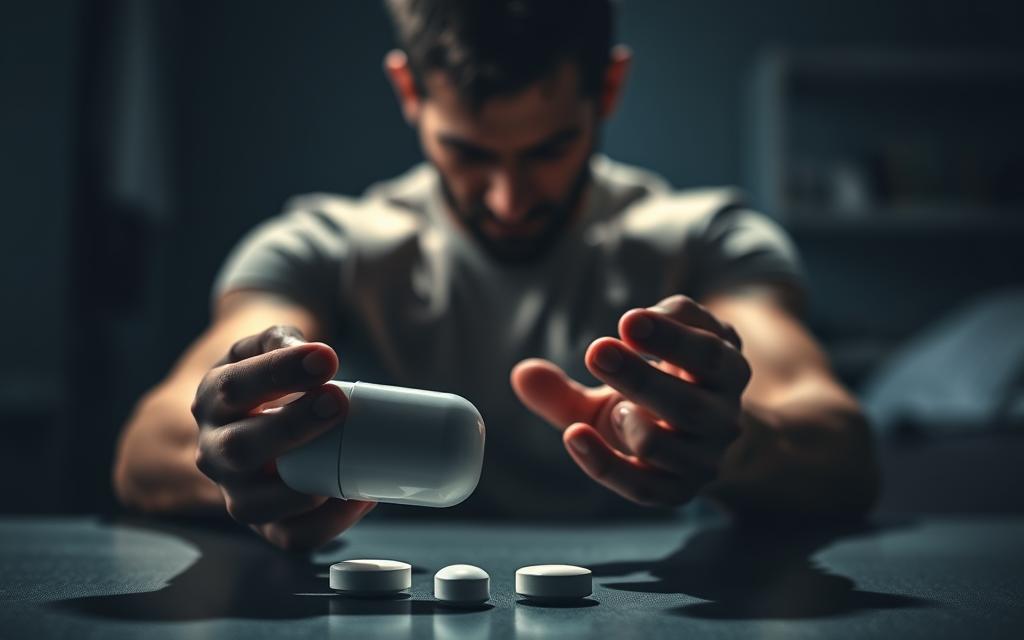Do Statins Cause Erectile Dysfunction? | Side Effects & Insights
The relationship between statins and erectile dysfunction has been a topic of concern for many individuals taking cholesterol-lowering medications. Statins are widely prescribed to manage high cholesterol levels and reduce the risk of cardiovascular disease. However, some users have reported experiencing erectile dysfunction as a potential side effect.
A recent study highlighted in the National Center for Biotechnology Information analyzed cases of erectile dysfunction associated with statin use, revealing a significant number of reported instances. This has sparked interest in understanding the potential link between statin medication and sexual health.
This article aims to explore the current insights into the side effects of statins, particularly focusing on their potential impact on erectile function. By examining the available data and research findings, we will provide a comprehensive overview of this critical health concern.
Understanding Statins and Their Purpose
To understand the potential side effects of statins, it’s essential to first grasp their fundamental purpose. Statins are a group of medicines that are commonly prescribed to help lower cholesterol levels in the blood, thereby reducing the risk of heart disease.
What Are Statins and How Do They Work?
Statins work by inhibiting an enzyme in the liver (HMG-CoA reductase) that is necessary for the production of cholesterol. By reducing the liver’s production of cholesterol, statins help decrease the overall level of low-density lipoprotein (LDL) cholesterol, or “bad” cholesterol, in the blood. This process contributes to a reduced risk of cardiovascular events such as heart attacks and strokes.
Common Types of Statin Medications
Several types of statin medications are available, each with different properties and potencies. Some of the most commonly prescribed statins include atorvastatin (Lipitor), simvastatin (Zocor), and rosuvastatin (Crestor). The choice of statin depends on various factors, including the patient’s cholesterol levels, medical history, and potential interactions with other medications. For more information on managing cholesterol and statin resistance, visit WebMD’s resource on cholesterol tests and statin.
| Statin Medication | Brand Name | Common Dosage |
|---|---|---|
| Atorvastatin | Lipitor | 10-80 mg |
| Simvastatin | Zocor | 5-80 mg |
| Rosuvastatin | Crestor | 5-40 mg |
Erectile Dysfunction: Causes and Risk Factors
Erectile dysfunction is a complex condition that affects millions of men worldwide, often stemming from a combination of physical, psychological, and lifestyle factors. Understanding its causes and risk factors is essential for addressing the condition effectively.
Defining Erectile Dysfunction
Erectile dysfunction (ED) refers to the inability to achieve or maintain an erection sufficient for satisfactory sexual performance. It’s a condition that can significantly impact a man’s quality of life, affecting not just sexual health but also mental well-being.
Common Causes of Erectile Dysfunction
The causes of erectile dysfunction are multifaceted, including:
- Cardiovascular disease: Conditions like high blood pressure and atherosclerosis can impair blood flow.
- Diabetes: Damages nerves and blood vessels, contributing to ED.
- Psychological factors: Stress, anxiety, and depression can play a significant role.
- Lifestyle factors: Smoking, excessive alcohol consumption, and lack of physical activity.
Risk Factors That Contribute to ED
Several risk factors can increase the likelihood of developing erectile dysfunction, including:
- Age: The risk increases with age.
- Obesity: Being overweight can contribute to ED.
- Smoking: Damages blood vessels and reduces blood flow.
Do Statins Cause Erectile Dysfunction? The Research
The potential link between statin use and erectile dysfunction is a complex issue that requires careful examination. Statins are widely prescribed to lower cholesterol levels and prevent cardiovascular disease, but concerns have been raised about their possible impact on sexual health.
Clinical Studies on Statins and Sexual Function
Several clinical studies have investigated the relationship between statins and erectile dysfunction. A notable study published in the Journal of Clinical Lipidology found that statin therapy was associated with improved erectile function in men with hyperlipidemia. Conversely, another study in the Journal of Sexual Medicine reported a higher incidence of erectile dysfunction among statin users.
These conflicting findings highlight the need for further research. Key aspects to consider include:
- The type and dosage of statins used
- The duration of statin therapy
- Underlying health conditions of the participants
Conflicting Evidence in Medical Literature
The medical literature on statins and erectile dysfunction presents a mixed picture. Some studies suggest that statins may improve erectile function by enhancing endothelial function, while others indicate a potential negative impact on sexual health.
What Medical Experts Currently Believe
Despite the conflicting evidence, many medical experts believe that the benefits of statins in reducing cardiovascular risk outweigh the potential risks of erectile dysfunction. However, they emphasize the importance of individualized care and monitoring for potential side effects.
Key considerations for patients include:
- Discussing concerns with their healthcare provider
- Monitoring sexual health while on statin therapy
- Exploring alternative treatments if necessary
Potential Mechanisms: How Statins Might Affect Sexual Function
The potential link between statins and erectile dysfunction has sparked interest in understanding the biological mechanisms that might underlie this connection. Statins are known to affect cholesterol levels significantly, and cholesterol plays a crucial role in hormone production, including sex hormones.
Cholesterol’s Role in Hormone Production
Cholesterol is a precursor to steroid hormones, including testosterone and estrogen, which are vital for sexual function. Research suggests that altering cholesterol levels could impact hormone production, potentially affecting sexual health. A study published in the National Institutes of Health database explores the relationship between statin use and hormonal changes.
Other Biochemical Pathways Affected by Statins
Besides hormone production, statins influence other biochemical pathways that could impact sexual function. For instance, statins affect endothelial function and nitric oxide production, both critical for erectile function. The table below summarizes key biochemical pathways affected by statins and their potential impact on sexual health.
| Biochemical Pathway | Statin’s Effect | Potential Impact on Sexual Health |
|---|---|---|
| Cholesterol Synthesis | Reduced cholesterol production | Altered hormone production |
| Endothelial Function | Improved nitric oxide production | Enhanced erectile function |

Other Statin Side Effects That May Impact Sexual Health
While statins are generally well-tolerated, they can cause a range of side effects that may indirectly impact sexual health. These effects can vary widely among individuals and may influence overall well-being in several ways.
Some of the common side effects include:
- Muscle pain and fatigue
- Psychological effects such as mood changes
- Interactions with other medications
Muscle Pain and Fatigue
Muscle pain, or myalgia, is a frequently reported side effect of statins. This discomfort can range from mild to severe and may be accompanied by fatigue. Such symptoms can significantly impact daily activities and overall quality of life, potentially affecting sexual function indirectly.
Psychological Effects of Medication
Some individuals taking statins may experience psychological effects, including mood changes, anxiety, or depression. These psychological changes can have a profound impact on sexual health, as mental well-being is closely linked to sexual function.
Interaction With Other Medications
Statins can interact with other medications, potentially leading to adverse effects. For instance, certain drug interactions can increase the risk of muscle damage or enhance the sedative effects of other medications, indirectly affecting sexual health.
Managing Sexual Side Effects While Taking Statins
While statins are effective for heart health, their sexual side effects can be concerning; fortunately, there are ways to manage these issues. If you’re experiencing sexual dysfunction or other related problems while on statin therapy, it’s essential to address these concerns proactively.
When to Talk to Your Doctor
If you’re experiencing persistent or bothersome sexual side effects, it’s crucial to discuss them with your healthcare provider. They can help determine whether the symptoms are related to statin use or if there’s another underlying cause. Be prepared to describe your symptoms in detail, including when they started and any factors that seem to exacerbate or relieve them.
Potential Medication Adjustments
Your doctor may consider adjusting your statin dosage or switching you to a different statin medication. Some statins may have a lower risk of sexual side effects than others. For instance, a study published in the Frontiers in Pharmacology journal explored the side effect profiles of various statins, which could inform your doctor’s decision.

Alternative Statins With Different Side Effect Profiles
Different statins have varying side effect profiles. For example, some may be more likely to cause muscle pain, while others might have a higher risk of sexual dysfunction. Your doctor can help you navigate these differences to find a statin that balances efficacy with tolerability.
Lifestyle Changes That May Help
In addition to medication adjustments, certain lifestyle changes can help alleviate sexual side effects. These may include regular exercise, a balanced diet, stress management techniques, and addressing other cardiovascular risk factors. By adopting a healthier lifestyle, you may be able to mitigate some of the sexual side effects associated with statin therapy.
| Strategy | Description | Potential Benefit |
|---|---|---|
| Consult Your Doctor | Discuss your symptoms and potential medication adjustments | Identify alternative statins or dosages with fewer side effects |
| Lifestyle Modifications | Adopt a healthier diet, exercise regularly, and manage stress | Mitigate sexual side effects and improve overall health |
| Medication Adjustment | Consider changing statin medication or dosage | Reduce the risk of sexual side effects while maintaining cardiovascular benefits |
Conclusion: Balancing Heart Health and Sexual Function
Balancing heart health and sexual function is crucial for overall well-being. The relationship between statins and erectile dysfunction is complex, with various factors at play. While statins are effective in managing cholesterol levels and reducing cardiovascular risk, their potential impact on sexual health cannot be overlooked.
It’s essential to weigh the benefits of statin therapy against potential side effects and consider individual health priorities. By understanding the potential mechanisms by which statins may affect sexual function, individuals can make informed decisions about their health.
Healthcare providers play a vital role in managing the balance between heart health and sexual function. They can help patients navigate potential side effects, adjust treatment plans as needed, and recommend lifestyle changes that support overall health.
Ultimately, achieving a balance between heart health and sexual function requires a holistic approach to health management, incorporating medical treatment, lifestyle modifications, and open communication with healthcare providers.
